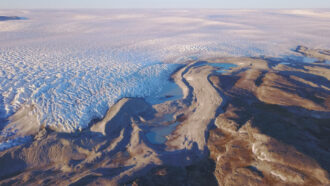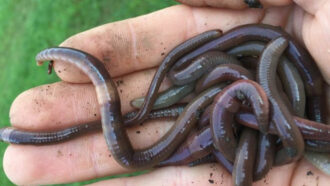| | | | | | | | | |  | | 50 years ago, an experimental drug hinted at serotonin's many roles in the brain Sep 29 2020 7:00 AM Clues from a chemical - Science News, October 3, 1970 An experimental drug's effects on the sexual behavior of certain animals is arousing interest among investigators.... The drug, para-chlorophenylalanine ... reduces the level of a naturally occurring neurochemical, serotonin, in the brain of rats, mice and dogs.... Little is known about how serotonin acts in the […] | | | | | | |  | More Recent Headlines | | 'Schr��dinger's Web' offers a sneak peek at the quantum internet Sep 28 2020 8:00 AM For an entertaining overview of the physics and technological advances paving the way for the quantum internet, read 'Schrödinger's Web.' READ MORE  | | A stop-motion experiment reveals supercooled water���s dual nature Sep 28 2020 6:00 AM Scientists found signs that water cooled well below freezing consists of two different arrangements of molecules. READ MORE  | | Defects in early immune responses underlie some severe COVID-19 cases Sep 25 2020 6:11 PM Scientists are finding that strong early immune responses to the coronavirus are crucial to protect some people from developing life-threatening symptoms. READ MORE  | | A new moon radiation measurement may help determine health risks to astronauts Sep 25 2020 5:31 PM China's lunar lander measured radiation at the moon's surface, finding the daily dose is 2.6 times as high as inside the International Space Station. READ MORE  | | Tiny, magnetically controlled robots coax nerve cells to grow connections Sep 25 2020 2:00 PM Research using microrobots and nerve cells from rats could point to new treatments for people with nerve injuries. READ MORE  | | Trapped under ice, light-loving algae grow in the dark Arctic winter Sep 25 2020 2:00 PM Blocked off from nearly all light beneath a thick layer of ice and snow in the winter, marine phytoplankton in the Arctic still find a way to thrive. READ MORE  | | Hope for life on Venus survives for centuries against all odds Sep 25 2020 6:00 AM Early scientists often assumed that Venus, though hotter than Earth, hosted life. READ MORE  | | A Brazilian city devastated by COVID-19 may have reached herd immunity Sep 24 2020 12:21 PM Up to half of Manaus was infected at the epidemic's peak, which slowed further spread of the virus but also led to many deaths, scientists say. READ MORE  | | Life on Earth may have begun in hostile hot springs Sep 24 2020 6:00 AM What researchers learn at hot springs and seafloor vents may guide the search for life on icy moons and Mars. READ MORE  | | A beaked whale's nearly four-hour-long dive sets a new record Sep 23 2020 6:00 PM The animals may rely on large stores of oxygen, a slow metabolism and the ability to tolerate lactic acid to go for hours without surfacing for air. READ MORE  | | | | | | 
|






Post a Comment